My farm is not a farm.
Identity is a touchy subject in my profession. It's a generally accepted rule that you don't call yourself a Librarian unless you have a Master's degree in some sort of information studies. Just like a Nurse wouldn't call herself a Doctor, the terminology matters to us. When I use the word "farm" to describe my humble abode, it's tongue-in-cheek, started as a way to make fun of the little mud pit we built a homestead in. My grandparents, or heck we don't even have to go back that far - my parents would call what I do "having a garden," or just "life." I don't make any money from my "farm" and I certainly don't have to deal with the myriad and burdensome regulations that real farmers have to sort through to make it legal. And most importantly, if one of my crops fails I'm not left destitute or at the mercy of the bank. My modest lifestyle, or at least my job security, is a life of luxury compared to many farmers.
I recently attended the California Small Farm Conference for a second time, having attended the first time last year in Valencia, just about 20 minutes from my house. The best part of the Farm Conference is the farm tour day, held before the sessions start. There's always a few different options so you can select whichever one matches your interest. Last year I selected the Urban Farm Tour, which promised to visit real working farms right here in LA, or well, Altadena anyway. Awesome, right? I thought I could find out how to actually make a living in farming in this beautiful little city, and I thought I would learn about how to do it legally, knowing that regulations on such things are almost insurmountable. Turns out every "farm" we visited was just another version of what I do. A few chickens, some vegetables, maybe some bees, all financially unsustainable and downright illegal, and every damn one of them calling themselves a farm in a completely un-ironic way. On top of all that, every one of the "farmers" was (by my standards) filthy rich, from pursuits other than farming.
I figured this year, with the conference being held in Fresno, the hipster farmers wouldn't be committed enough to travel. It's kind of sad that I was right, but I didn't miss them. This crowd was the real deal. From the farmers to the researchers to the journalists to the few farm groupies like myself, everyone I encountered was realistic about farming and knowledgeable about the issues facing farms today. And boy are there ever big issues right now, government regulation being number one.
Many of the sessions I attended featured two farmers and some sort of government entity representative, or in other words, inspiration and then the cold hard reality. Not surprisingly, the interpretation and implementation of the Cottage Food Act is being mangled by bureaucrats, leaving it useless to many. And new legislation regulating CSAs is in the works, which is bad news for anyone involved in this formerly grass-roots farm-saving business model. In the panel I attended on CSAs, neither of the farmer panelists will qualify to use that term anymore under the new regulations, even though both are clearly the real deal, and neither wanted to be protected from what the State thinks they need protection from (that being people who might form CSAs out of the wholesale produce markets in LA and SF). Water rights and access is another alarming issue, with all kinds of new regulations and interpretations being set every day, and new rules about food safety are nipping at farmers' heels too. The push and pull between organic and conventional methods and all the shades of gray that are so hard to convey to consumers who only want to see in black and white is maddening. And last but not least, population and development, and access to land and capital are old news in our expensive golden state. I suppose it's knowing all of this that makes the frivolous use of the words farm and farmer irksome to me, just as I'd be annoyed if just anyone working in a library called themselves a Librarian. But kudos to those who keep a sense of irony or whimsy, and those who know what they don't know about being a farmer, and those who try to learn as much as they can, and those who find some other term. Micro-Farm is among my favorites. For now, I am not a farmer. I'm just happy that they let me be a part of their world every year.
Farm Tours, 2013. My selection: "Diversity of Crops, Diversity of People," focusing on growing and marketing unique produce.
The farmer on our first stop used to grow all kinds of different produce. Now he's aging, his wife is ill, and his children aren't that interested in farming. So he planted less-labor-intensive almonds this year, and eggplants amongst them while he waits for them to become productive.
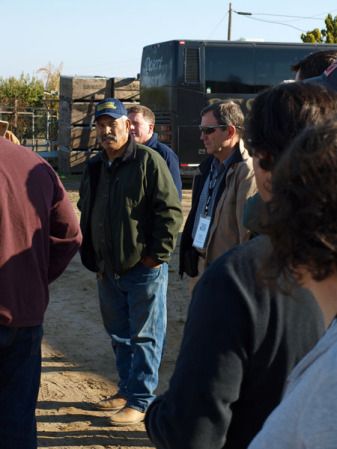
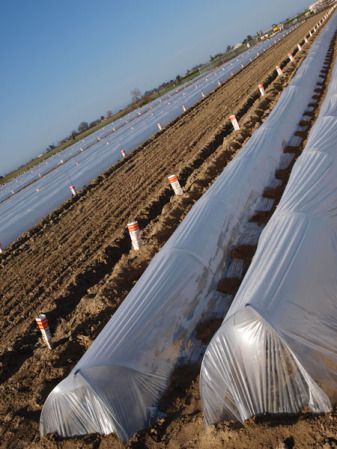
Tiny eggplant under cover, he said he hopes to harvest by May.
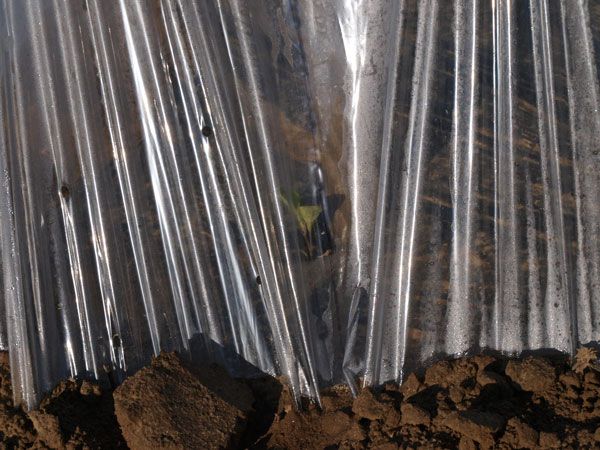
His original equipment he started with when he immigrated here from Mexico.
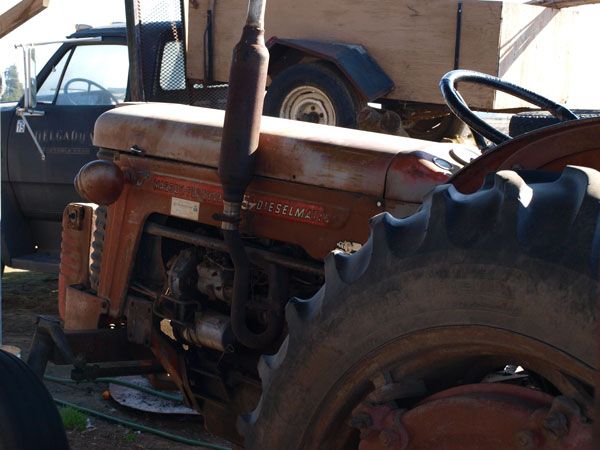
The Hmong farmer we visited next, who fed us a delicious Laotian lunch. Well, pre-lunch, since we ate again at our last stop. He also gave us loofah seeds.
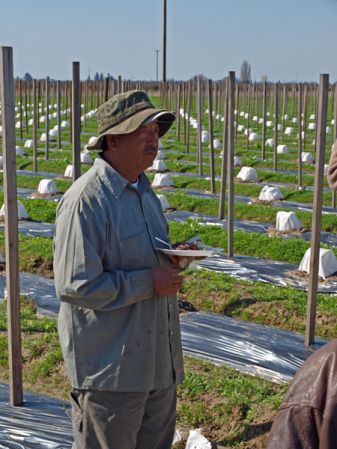
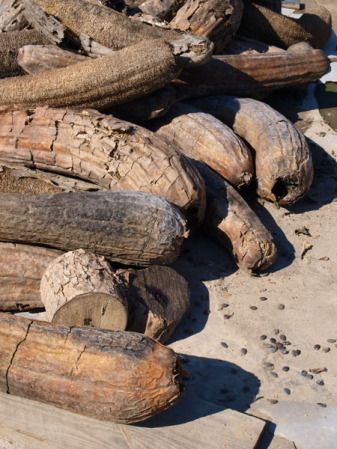
High Tunnels and Jujube trees.
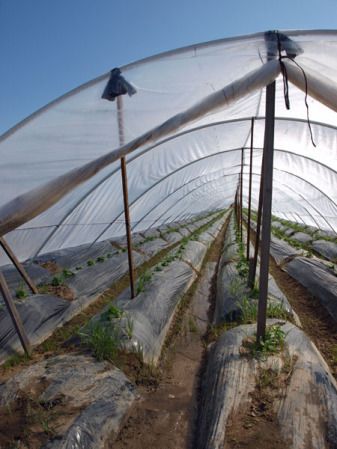
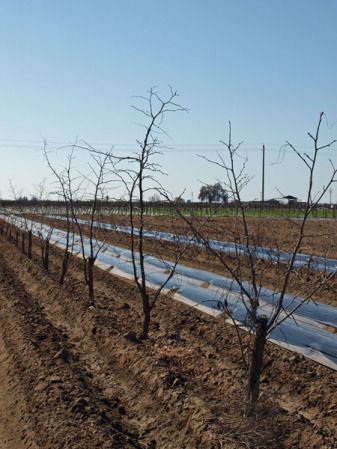
And then we visited a citrus farm during harvest. This, even more than our other stops, raised some interesting issues about the ethics of the observer, but that's another rant for another time.
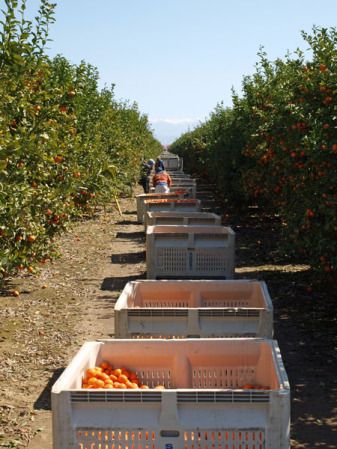
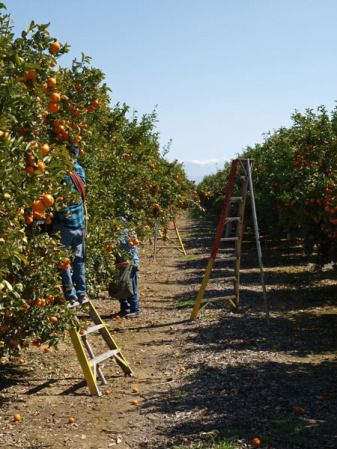
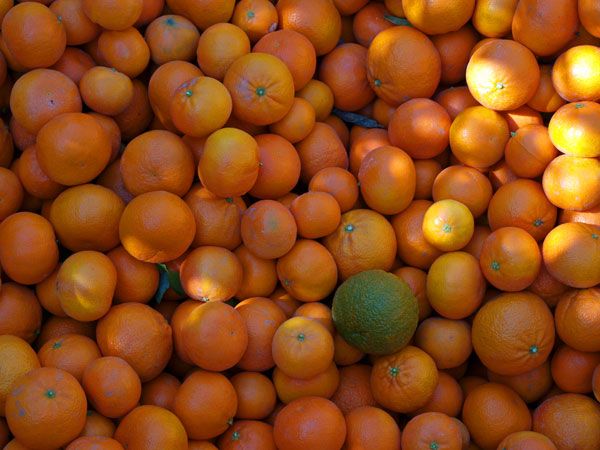
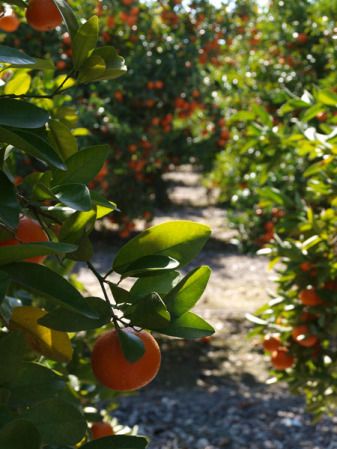
The whole Valley was in bloom.
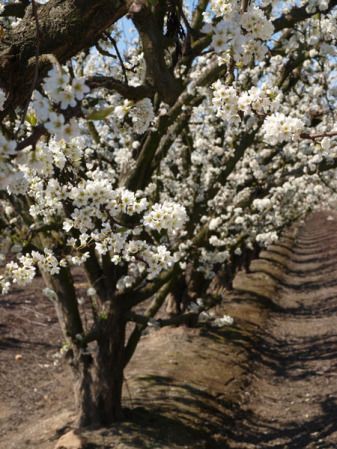
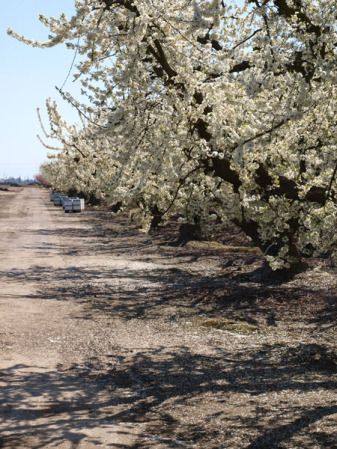
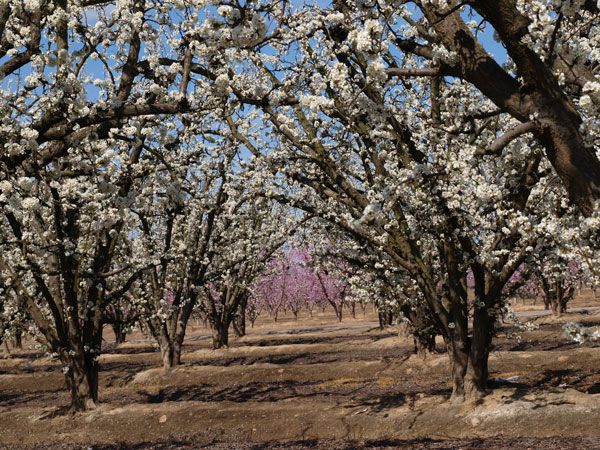
Our last stop was a peach farmer/painter who doesn't grow organically but does grow sustainably. He fed us a Mediterranean feast.
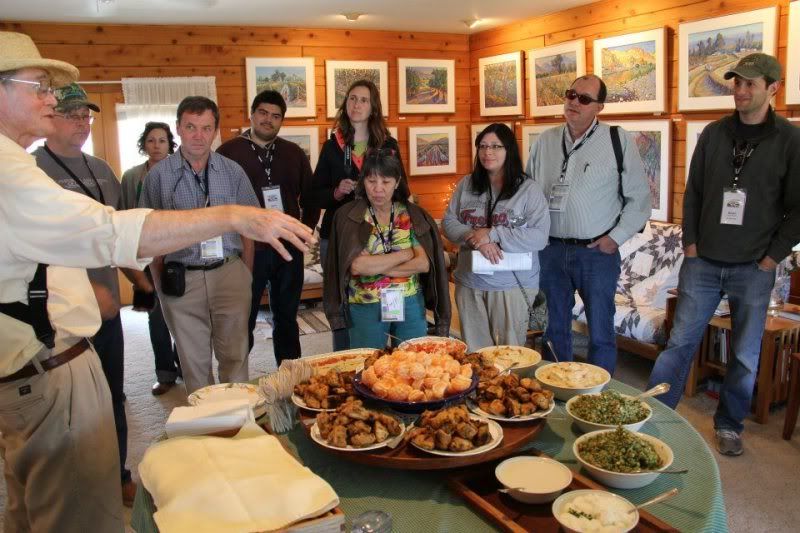
[photo credit: Aziz Baameur]
I'm amazed at the color he's able to find in the Central Valley scenery.
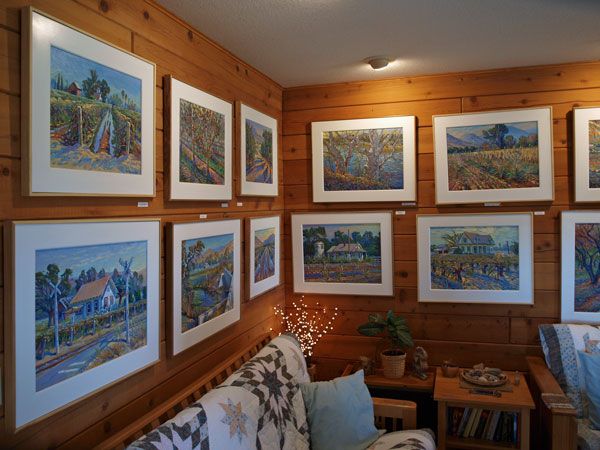
His peaches and his dog.
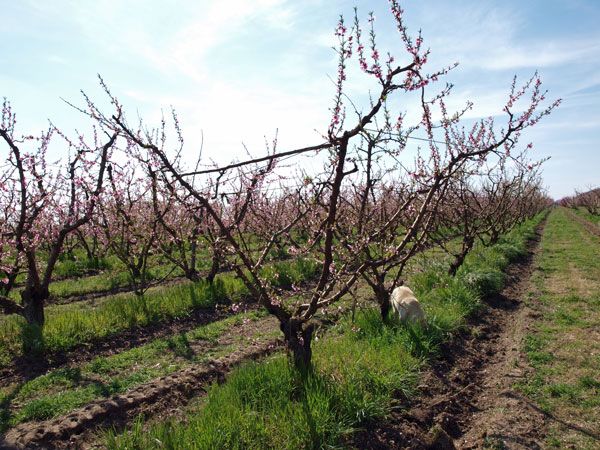
He scooped up a shovel of his dirt and dumped it on the road with a shovel of his neighbor's dirt, from this orchard. His was dark and rich and his neighbor's barren, reinforcing his ideas about intensive composting.
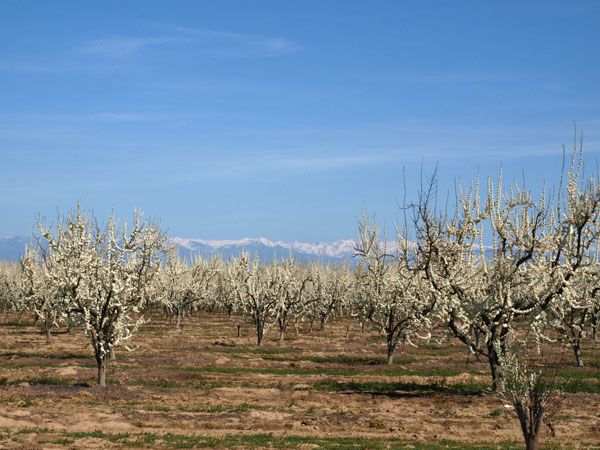
Our tour group.
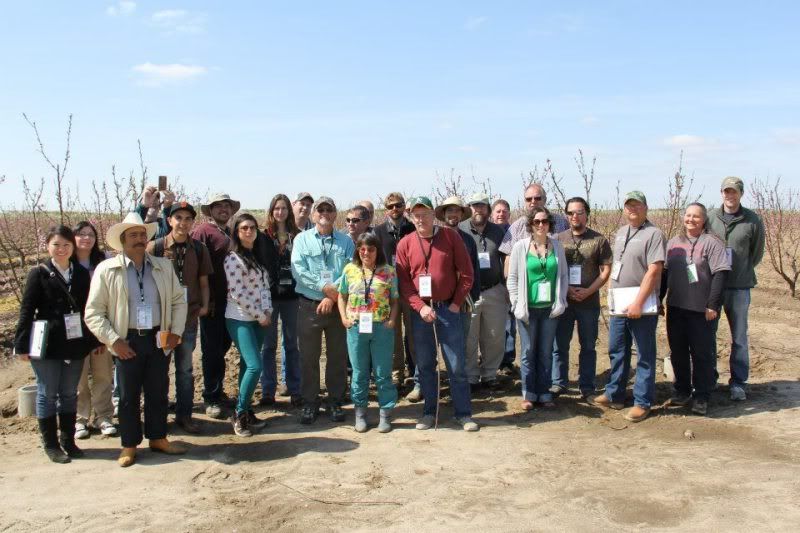
[photo credit: Aziz Baameur]
When it comes to food, the people of Fresno are having the last laugh on all of us. They get the freshest, widest variety in the nation, and some of it never even makes it's way to LA or SF or any of their burbs.
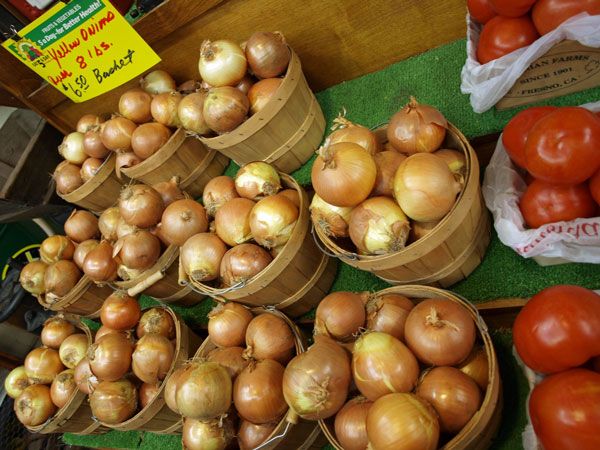
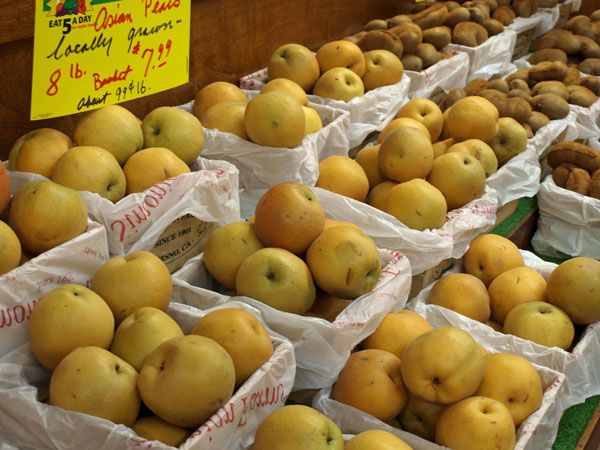
It was an inspiring conference, with inspiring people, and inspiring produce. Next year: Sonoma. AKA "home."
I recently attended the California Small Farm Conference for a second time, having attended the first time last year in Valencia, just about 20 minutes from my house. The best part of the Farm Conference is the farm tour day, held before the sessions start. There's always a few different options so you can select whichever one matches your interest. Last year I selected the Urban Farm Tour, which promised to visit real working farms right here in LA, or well, Altadena anyway. Awesome, right? I thought I could find out how to actually make a living in farming in this beautiful little city, and I thought I would learn about how to do it legally, knowing that regulations on such things are almost insurmountable. Turns out every "farm" we visited was just another version of what I do. A few chickens, some vegetables, maybe some bees, all financially unsustainable and downright illegal, and every damn one of them calling themselves a farm in a completely un-ironic way. On top of all that, every one of the "farmers" was (by my standards) filthy rich, from pursuits other than farming.
I figured this year, with the conference being held in Fresno, the hipster farmers wouldn't be committed enough to travel. It's kind of sad that I was right, but I didn't miss them. This crowd was the real deal. From the farmers to the researchers to the journalists to the few farm groupies like myself, everyone I encountered was realistic about farming and knowledgeable about the issues facing farms today. And boy are there ever big issues right now, government regulation being number one.
Many of the sessions I attended featured two farmers and some sort of government entity representative, or in other words, inspiration and then the cold hard reality. Not surprisingly, the interpretation and implementation of the Cottage Food Act is being mangled by bureaucrats, leaving it useless to many. And new legislation regulating CSAs is in the works, which is bad news for anyone involved in this formerly grass-roots farm-saving business model. In the panel I attended on CSAs, neither of the farmer panelists will qualify to use that term anymore under the new regulations, even though both are clearly the real deal, and neither wanted to be protected from what the State thinks they need protection from (that being people who might form CSAs out of the wholesale produce markets in LA and SF). Water rights and access is another alarming issue, with all kinds of new regulations and interpretations being set every day, and new rules about food safety are nipping at farmers' heels too. The push and pull between organic and conventional methods and all the shades of gray that are so hard to convey to consumers who only want to see in black and white is maddening. And last but not least, population and development, and access to land and capital are old news in our expensive golden state. I suppose it's knowing all of this that makes the frivolous use of the words farm and farmer irksome to me, just as I'd be annoyed if just anyone working in a library called themselves a Librarian. But kudos to those who keep a sense of irony or whimsy, and those who know what they don't know about being a farmer, and those who try to learn as much as they can, and those who find some other term. Micro-Farm is among my favorites. For now, I am not a farmer. I'm just happy that they let me be a part of their world every year.
Farm Tours, 2013. My selection: "Diversity of Crops, Diversity of People," focusing on growing and marketing unique produce.
The farmer on our first stop used to grow all kinds of different produce. Now he's aging, his wife is ill, and his children aren't that interested in farming. So he planted less-labor-intensive almonds this year, and eggplants amongst them while he waits for them to become productive.


Tiny eggplant under cover, he said he hopes to harvest by May.

His original equipment he started with when he immigrated here from Mexico.

The Hmong farmer we visited next, who fed us a delicious Laotian lunch. Well, pre-lunch, since we ate again at our last stop. He also gave us loofah seeds.


High Tunnels and Jujube trees.


And then we visited a citrus farm during harvest. This, even more than our other stops, raised some interesting issues about the ethics of the observer, but that's another rant for another time.




The whole Valley was in bloom.



Our last stop was a peach farmer/painter who doesn't grow organically but does grow sustainably. He fed us a Mediterranean feast.

[photo credit: Aziz Baameur]
I'm amazed at the color he's able to find in the Central Valley scenery.

His peaches and his dog.

He scooped up a shovel of his dirt and dumped it on the road with a shovel of his neighbor's dirt, from this orchard. His was dark and rich and his neighbor's barren, reinforcing his ideas about intensive composting.

Our tour group.

[photo credit: Aziz Baameur]
When it comes to food, the people of Fresno are having the last laugh on all of us. They get the freshest, widest variety in the nation, and some of it never even makes it's way to LA or SF or any of their burbs.


It was an inspiring conference, with inspiring people, and inspiring produce. Next year: Sonoma. AKA "home."